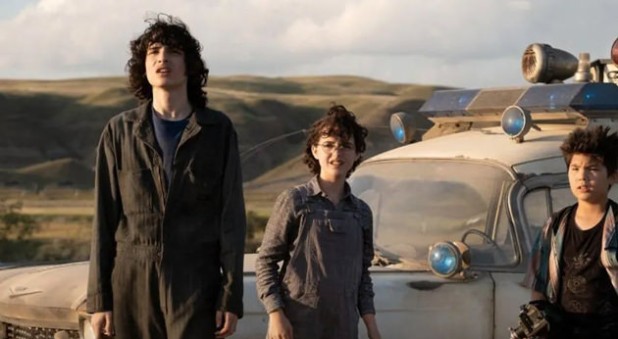Ghostbusters: Afterlife
Rated PG
Some coarse language and innuendo
One of the things that appealed to me about the original Ghostbusters movie was that it dared to consider what might happen as the end of time approached. Of course, it did so without any real depth and with its tongue firmly planted in its cheek, but it was still a surprise at the time to see two characters – Winston and Ray – talk about God and final judgement.
W: “Ray, do you believe in God?”
R: “Never met him.”
W: “Well, I do, and I love Jesus’s style, you know... Ray, do you remember something in the Bible about the last days when the dead would rise from the grave?... Has it ever occurred to you that maybe the reason we’ve been so busy lately is because the dead have been rising from the grave?”
Amid that final quote above, Ray, played by Dan Aykroyd, answers Winston (Ernie Hudson) by quoting Revelation: “When he opened the sixth seal, I looked, and behold, there was a great earthquake, and the sun became black as sackcloth, the full moon became like blood”.
Judgement day, they both say. One believes it is real. Another does not – or is unwilling to admit his discomfort at the idea of an all-powerful God.
Gods (plural) do exist in the Ghostbusters universe, but they’re the type that can be vanquished by science, planning and teamwork. And in Ghostbusters: Afterlife we can add friendship and family to the list.
Don’t get me wrong. I loved the first Ghostbusters movie and enjoyed this one tremendously. It contains numerous connection points to the original – so many, in fact, that director Jason Reitman (son of Ivan Reitman, who directed the first film in 1984) has described it to fans as “the greatest Easter egg hunt of your life”.
The film begins in the tiny town of Summerville where someone whose face we don’t see is fleeing from, and setting traps for, a dangerous supernatural being. He dies amid this work, and we soon discover it was former Ghostbuster Egon Spengler (played in the original film by the late Harold Ramis). His estranged daughter and her two kids wind up living in the house – which he has left to them.
The younger of the children, Phoebe (Mckenna Grace), is just like her grandfather: tremendously clever, emotionally withdrawn and a bit of a social misfit. Shortly after their arrival at the house she begins to have a game of chess with an unseen being, and eventually follows hints to a basement workshop/laboratory, where she is guided towards old ghostbusting equipment.
While her brother begins to fix the old Ectomobile in the shed, Phoebe and her new friend Podcast (played with nerdy enthusiasm by Logan Kim) begin to piece together what her grandfather was doing, and the reason why this little Oklahoma town is experiencing constant, inexplicable earthquakes.
There’s plenty of impressive CGI, the performances are top-notch, particularly from young Mckenna Grace, and the script – while not as good as the original – contains some cracking lines.
The two hours of the film sped by, and while some regard Ghostbusters: Afterlife as too derivative I didn’t get that feeling at all. Yes, elements of the original have been included with loving care, but it’s been done in a way that makes sense in a new context.
The film isn’t for small children as some supernatural themes and scenes will be too scary, but it was a lot of fun to watch. And while those who haven’t seen the first movie may not get all the in-jokes and extra detail, there is enough information for it to make sense on its own (and fans: make sure you wait for the end of the credits).
It would be nice if all the evil in this world could be extinguished by friends and family banding together to fight a common enemy, but we do have an answer and the Ghostbusters franchise has accidentally told it to viewers. Much is made in this film of the “judgement day” quote of Revelation 6:12, but in the original Ghostbusters film Dan Aykroyd’s character actually refers to Revelation 7:12, which shows a vision of heaven, in which people say:
“Amen! Blessing and glory and wisdom and thanksgiving and honour and power and might be to our God forever and ever!”






















